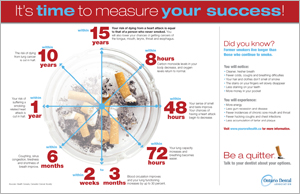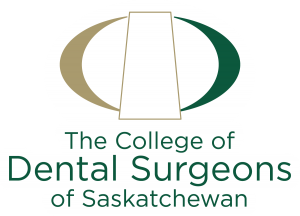"Giving up smoking is the easiest thing in the world. I know because I've done it thousands of times." – Mark Twain
 Nicotine is a difficult addiction to quit. But every attempt you make to quit brings you one step closer to success.
Nicotine is a difficult addiction to quit. But every attempt you make to quit brings you one step closer to success.
Quitting smoking and other tobacco use is the best thing you can do to improve your health — and your life.
Talk to your dentist about our options. Your smile will thank you for it.
→ Read the ODA media release, "Trying to Quit Smoking? Your Dentist Can Help."
- The FAQs on Tobacco and Your Oral Health
- Tips on Quitting
- How Your Dentist Can Help
- How to Measure Your Success
- Helpful Links and Resources
How does tobacco affect my oral health?
All types of tobacco – including cigarettes, cigars and chewing (or smokeless) tobacco – are harmful for your oral and overall health. In addition to containing nicotine, which is highly addictive, tobacco can increase your risk of:
- Oral cancer
- Periodontal (gum) disease—a leading cause of tooth loss and sensitivity
- Delayed healing after a tooth extraction or other oral surgery
- Fewer options for some kinds of dental care (smokers can be poor candidates for particular treatments such as implants)
- Bad breath
- Stained teeth and tongue
- Diminished sense of taste and smell
How can tobacco cause periodontal (gum) disease?
Smoking may be responsible for almost 75 percent of periodontal diseases among adults. Tobacco products damage your gum tissue by affecting the attachment of bone and soft tissue to your teeth. An example of the effect is receding gums. A receding gum line exposes the tooth roots and increases your risk of developing a sensitivity to hot and cold, or tooth decay in these unprotected areas.
What effects can smokeless tobacco have on my oral health?
Like cigarettes, smokeless tobacco products contain a variety of toxins associated with cancer. At least 28 cancer-causing chemicals have been identified in smokeless tobacco products.
Smokeless tobacco is known to cause cancers of the mouth, lip, tongue and pancreas. Users also may be at risk for cancer of the voice box, esophagus, colon and bladder, because they swallow some of the toxins in the juice created by using smokeless tobacco.
Smokeless tobacco can irritate your gum tissue, causing periodontal (gum) disease. Sugar is often added to enhance the flavour of smokeless tobacco, increasing the risk for tooth decay. Smokeless tobacco also typically contains sand and grit, which can wear down your teeth.
Are cigars a safe alternative to cigarettes?
Cigars are not a safe alternative to cigarettes. Even if you do not inhale cigar smoke, you are still at risk for oral and pharyngeal (throat) cancers. Like cigarette smokers, cigar smokers are at increased risk for periodontal (gum) disease, a leading cause of tooth loss. In addition to the health risks, cigar smoke, like cigarette smoke, can cause staining of the teeth and tongue as well as bad breath.
All other forms of tobacco, including pipes and rolled tobacco, are just as harmful to your health.
What are some of the signs of oral cancer?
Signs and symptoms that could indicate oral cancer include:
- Any sign of irritation, like tenderness, burning or a sore that will not heal
- Pain, tenderness or numbness anywhere in the mouth or lips
- Development of a lump, or a leathery, wrinkled or bumpy patch inside your mouth; colour changes to your oral soft tissues (gray, red or white spots or patches), rather than a healthy pink colour
- Difficulty chewing, swallowing, speaking or moving the jaw or tongue
- Any change in the way your teeth fit together.
See your dentist if you notice any of these changes.
Four in 10 smokers make an attempt to quit during the course of a year, but the withdrawal symptoms of nicotine are so severe, most smokers fail on their first attempt – less than two percent manage to remain smoke-free a year after quitting.
Deciding to stop smoking is the best decision you can make for your health, but it is also one of the hardest feats to accomplish.
- Set a date in the near future. This will allow you time to prepare yourself mentally and emotionally. Choose a time when stress will be lower.
- Tell your family, friends and co-workers that you are quitting. Building a support system will improve your chances of quitting.
- Investigate and use all resources available to you, such as books, websites and brochures. (Go to the bottom of this page for helpful links.)
- Tell your dentist or physician you are quitting. Not only can they provide guidance and support, they can recommend and prescribe tobacco cessation medication.
- Avoid environments or situations that could tempt you, or put you in contact with people who smoke.
- Anticipate triggers to tobacco use and be prepared to avoid them. Chew sugarless gum, go for a walk or pick up a hobby to distract you.
- Reward yourself for reaching small goals. For example, treat yourself to a nice meal with family or friends to celebrate one week of being smoke-free.
- Put the money you would normally spend on tobacco in a jar. At the end of the year, take that money and spend it on a vacation or a new wardrobe!
DID YOU KNOW?
If you smoke one pack of cigarettes per day (at an average of $8 a pack) you will save at least $2,920 a year by quitting!
Dentists have advantages over other health-care professionals in providing tobacco cessation services to their patients. For one thing, people generally see their dentists on a more frequent and consistent basis through regular dental appointments. Dentists can also easily spot the damage tobacco does to the mouth and teeth — smokers tend to suffer from bad breath, stained teeth and dry mouth. People who smoke are also three times more likely to have severe periodontitis (gum disease) than non-smokers.
As an expert in oral health care, your dentist is trained and skilled in detecting gum disease, signs of oral cancer and other problems in your mouth. Smokers may be completely unaware of the impact that smoking can have on their oral health. Dentists can educate and inform patients of the risks, and can help patients who smoke stop before the impact worsens.
Dentists can also suggest – and, in some cases, prescribe – tobacco cessation medication for severe withdrawal symptoms.
The great advantage of quitting tobacco is that the benefits become apparent within 48 hours.
 Once you quit smoking, you will soon notice:
Once you quit smoking, you will soon notice:
- Cleaner, fresher breath
- Your hair and clothes no longer smell of smoke
- Fewer colds, coughs and breathing difficulties
- The stains on your fingers will slowly disappear
- Less staining on your teeth
- More money in your pocket
You will also experience:
- More energy
- Less gum recession and disease
- Few incidences of chronic sore mouth and throat
- Fewer hacking coughs and chest infections
- Less accumulation of tarter and plaque
DID YOU KNOW?
Former smokers live longer than those who continue to smoke.>
Smokers' Helpline
Smokers' Helpline is a free, confidential and non-judgmental service available to Ontarians who want to quit tobacco use or need help staying smoke-free. Smokers' Helpline offers phone, online and text-messaging services.
Quit Smoking Guides: One Step at a Time (Canadian Cancer Society)
These guides are based on the best available science about quitting smoking.
- One Step at a Time: For smokers who don't want to quit. Helps you understand your smoking habit and how smoking affects the people around you. Supports you with information on quitting – without pressuring you to quit.
- One Step at a Time: For smokers who want to quit. Helps you prepare to quit and set a date to improve your chances of success. Helps you develop a plan for the days immediately before and after you quit smoking
- One Step at a Time: If you want to help a smoker quit. Smokers themselves have to decide that they want to quit, but there are ways that you can help make the quitting process a little easier.
On the Road to Quitting: Guide to Becoming a Non-smoker (Health Canada)
This guide will help patients prepare and take action to successfully stop smoking. Also available in a PDF version for download.
Quit4Life (Health Canada)
A program to help 12- to 18-year-olds quit smoking, the Quit 4 Life handbook will help them learn about why they smoke, how to quit and how to stay quit.
The U.S. Centers for Disease Control and Prevention
The Tips from Former Smokers campaign features real people suffering as a result of smoking and exposure to secondhand smoke. Their compelling stories send a powerful message: Quit smoking now. Or better yet — don't start.
Sources:
Health Canada, American Dental Association, Canadian Cancer Society, The Center for Addiction and Mental Health, The Lung Association
